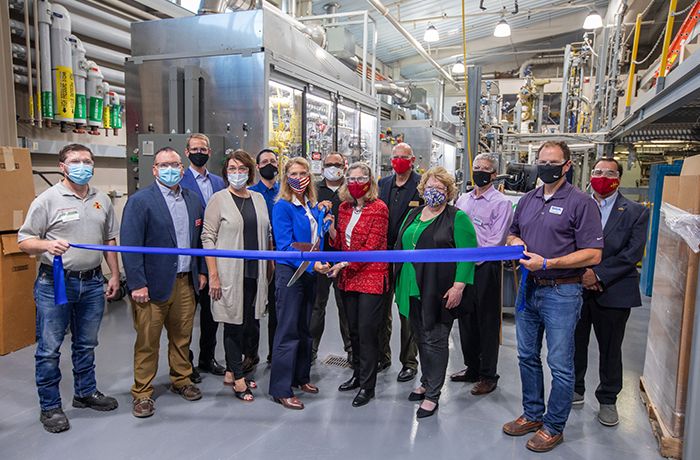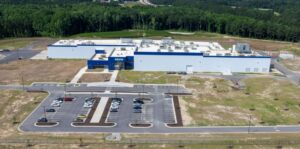This sponsored article has been published in partnership with America’s Cultivation Corridor.
As companies and organizations around the world look to reduce their environmental footprint and meet sustainability goals, a growing number are leveraging custom-made renewable fuel solutions from Iowa-based companies. Renewable Energy Group (REG) in Ames, Iowa, is one such company providing innovative solutions to government and industry. It takes low-value feedstocks like waste and byproduct fats and oils, and refines them into higher-value fuels with lower carbon emission profiles than petroleum diesel.
“Historically, the demand for our products has come from regulation, but we’re seeing an exciting shift. As society demands change, end users are seeing they have the ability to be part of the climate solution,” said Kristin Dillavou, manager of corporate environmental and social responsibility at REG. “We are working with customers and stakeholders to understand their challenges and priorities and develop solutions to meet their unique needs.”
REG is a global leader in the development of biodiesel and renewable diesel fuels. The company began as operations within West Central Cooperative (now Landus) in Ralston, Iowa, in 1996, as a way to add value to grain produced by farmer-members. It grew along with the biodiesel industry and became an independent corporation in August 2006.
Today, it has 12 bio-based diesel plants in the US and Germany, and makes both biodiesel and renewable diesel from the same feedstock sources including soybean oil, distillers corn oil, beef tallow, choice white grease from pork plants, used cooking oil, and brown grease from city sewer systems.
Product and feedstock innovations
Biodiesel has been widely used in blends with petroleum-based diesel for a number of years.
Renewable diesel is a newer offering, which is refined through a different process. It results in a hydrocarbon fuel that is a true drop-in replacement for petroleum diesel. Both fuels come with important environmental benefits, including improved air quality and lower fossil carbon emissions. REG also offers REG Ultra Clean, which is a blend of both biodiesel and renewable diesel that serves as a premium product with optimal benefits.
“In 2020, REG produced 519 million gallons of biofuels, which equates to 4.2 million metric tons of carbon reduction. The carbon reduction potential of our fuel will continue to improve as we invest more in decarbonizing our own operations and look to utilize additional low-carbon feedstocks,” said Dillavou.
In October 2021, REG and Iowa State University (ISU) celebrated the start of a new hydrotreater pilot plant at the BioCentury Research Farm near Ames, Iowa. The new plant will utilize the expertise of both organizations to better understand how various biomass feedstocks can play a role in production of renewable fuels, with a specific focus on renewable diesel. The project is a result of a three-year collaboration between REG and the ISU Bioeconomy Institute.
“REG and ISU have had a longstanding partnership focused on continued innovation,” said Dillavou. “We’re excited that the state of Iowa will continue to lead the industry as we develop additional feedstock options to help meet the growing demand for cleaner fuels.”
Tailored solutions for fleets
Developing products is just the first step. REG works with industry, corproate, and government teams to develop solutions specific to their unique requirements. This is increasingly driven by customer or constituent demand for more sustainable options.
“Companies are making very public statements to decarbonize operations and set bold sustainability goals. Governments are prioritizing decarbonization regulation, and investors are using the power of their money to support companies and organizations that are committed to making meaningful change,” Dillavou said.
One example is a partnership with Optimus Technologies that allows vehicles to run on 100% biodiesel, or B100. Biodiesel can have performance issues at lower temperatures, so it is often blended with petroleum diesel. Optimus’ new technology mitigates this limitation, allowing biodiesel to be utilized as B100. Vehicles are equipped to run on B100 through a simple vehicle add-on that works in conjunction with the conventional diesel vehicle components for exceptional performance. The system starts and shuts down the engine on conventional diesel, operating on 100% biodiesel only after the vehicle has reached optimal operating conditions. This allows vehicles to operate on B100 year-round.
Fleets across the country, including in Iowa, Massachusetts, and Washington DC, have adopted the technology and are in the process of expanding use of B100 for their vehicles. (Learn more about how companies and municipalities are meeting sustainability goals in this archived ‘Insights to Innovation’ webinar.)
“We offer customers an immediate and very cost-effective way to reduce their carbon footprint,” Dillavou said. ”
“The real value that comes from using these products is the ability to decarbonize now. The planet doesn’t have time to wait for silver-bullet technologies or infrastructure overhauls.”
She added that REG’s roots in agriculture and Iowa are a strong driver behind its ability to innovate for more sustainable solutions.
“Iowa is a great place to be. We’re always looking for new feedstocks and we’ve been able to build a culture of continuous improvement and innovation,” she said.
“With access to forward-thinking farmers and livestock producers, world-class research universities, and a strong base of leading agricultural companies, Iowa provides the combination of resources for the company to build on as it innovates with new products and technologies.”




